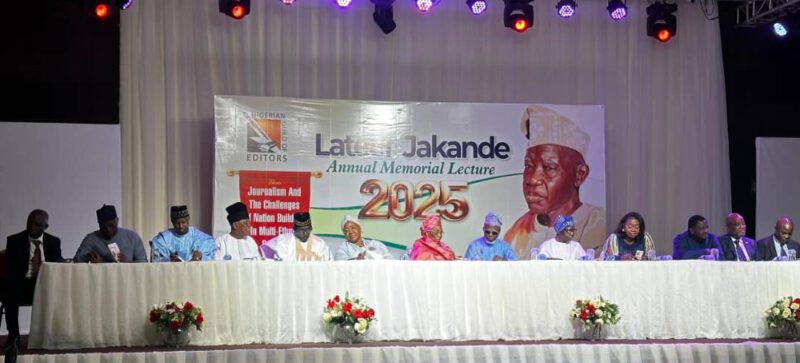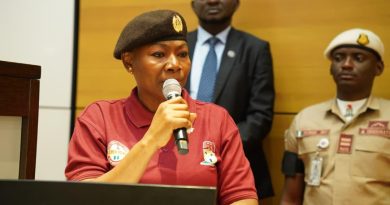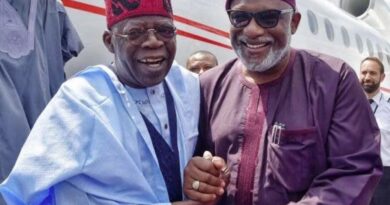At 3rd Memorial Lecture, Stakeholders Extol Jakande’s Virtues, Task Media On Holding Elected Officials Accountable
Stakeholders on Wednesday in Lagos harped on the role of the media in creating national consciousness for the purpose of nation-building and holding leaders accountable.
They also extoled the virtues of the first civilian governor of Lagos State, Alhaji Lateef Kayode Jakande, who was in the saddle between October 1, 1979 to December 31st 1983.

The event was the third Lateef Jakande Memorial Lecture, which took place in Ikeja area of Lagos under the theme “Journalism and the Challenges of Nation Building in Multi-ethnic Society”, organised by the Nigerian Guild of Editors.
The keynote speaker, Senator Bala Mohammed, the Governor of Bauchi State, in his remarks, noted that journalism is not just about reporting events, stressing that it’s about shaping the nation’s soul.
“In a multi-ethnic society like ours, where language, religion, and geography too often define identity, the media must help create national consciousness — a consciousness that values justice, merit, and shared destiny.
“We must not merely be a federation of ethnicities. We must be a nation of citizens. This requires cultivating national ethos: values that transcend our differences. Respect for life. Rule of law. Dignity of labour. Truth over tribe. As Martin Luther King Jr. famously said:
“I have a dream that my four little children will one day live in a nation where they will not be judged by the colour of their skin but by the content of their character.”
“I dream of a Nigeria where children are not judged by their surname, their state of origin, or their place of worship, but by the content of their character and the strength of their service.
” That dream can become reality — with the right leadership and with the right media. Citing an example from his experience in Bauchi State, he noted that despite their diverse population — religiously, ethnically, linguistically — Bauchi remains one of the most peaceful and united states in Nigeria.
“This is not by chance. It’s the result of deliberate, inclusive policies that reflect our belief in fairness, merit, and unity. We appoint based on ability, not ancestry. We build schools and health centres where they are needed, not where they’re politically convenient. Our traditional and religious leaders are empowered to act as bridges, not barricades.”
He suggested some possible actions that journalists must take: Defend the Rule of Law:
“The moment a society begins to ignore judicial decisions, it’s on the path to lawlessness. No nation can survive selective justice. The media must call out every instance where court orders are flouted — not because of who is involved, but because of what is at stake: the soul of the republic. And when conflict brews, let dialogue — not denial — be our first response.
“Demand Credible Leadership: Journalists must question every candidate, scrutinize every promise, and highlight integrity over popularity. Elections should be contests of ideas, not identities. Leadership must never be reduced to entitlement.
“Champion National Reconciliation: Nigeria must confront its past. We can no longer sweep historic grievances under the rug. A Truth and Reconciliation Summit, led in part by the media, could help heal our wounds.
“Promote Civic Education and Language Inclusion: Encourage — not mandate — the learning of Nigerian languages outside one’s own. Understanding each other is the first step to loving each other.
Begin With “Housekeeping: The media must fix its own broken windows. Exploiting interns, hoarding opportunities, turning a blind eye to corruption within — these must stop.
“The pen must remain clean to remain powerful. Why Nigeria must not fail, our survival as a nation is not optional. It’s imperative. Our size gives us leverage. Our diversity, properly harnessed, is strength. Our shared history binds us more than it divides. Our natural resources can fuel prosperity — if managed with integrity. Let the Nigerian media be the spark of that integrity.”
While eulogizing the late Jakande, he urged Nigerians to emulate the late governor.
“He never used his office to build empires. He built schools. He built houses. He built people. Let his life be a reminder that power is not what we hold — it is what we do with what we hold.”
On his part, Ogun State Governor Dapo Abiodun, who was represented by his special adviser on media, Akinmade Kayode, said that just as Jakande exemplified, journalists can be nation-builders-not just narrators of national woes.
“You must resist the temptations of sensationalism, partisanship, and undue influence from non-state actors.
“Nonetheless, I’m mindful of the many challenges journalism faces in Nigeria today. The spread of misinformation, digital disruption, censorship, and safety risks threaten the very fabric of your noble profession.
“As leaders, we understand the pivotal role journalists play in sustaining democracy, and we remain committed to fostering an enabling environment that protects and promotes your work.”
Presidential spokesperson, Mr Bayo Onanuga who came to represent the minister of information and orientation, Alhaji Mohammed Malagi, said Alhaji Jakande saved his company ICNL, publishers of AM, PM, Tempo and TheNews when it mattered most.
According to him, ” around 1995, when the Gen Sani Abacha’s government clamped down on us, he helped us to turn the Tempo to tabloid and all the copies printed were sold out.
“He also sold a property to us at a giveaway price. I will forever be grateful to him,” he added.
In her remarks, the first elected female deputy governor in Nigeria, Alhaja Sinatu Ojikutu, said the late Action Governor excelled in all aspects of governance.
” It’s not only schools and houses that he built. He also ensured that the health system and other social infrastructure were in place across the state.”
Ojikutu’s wish is that the Lagos State University, LASU, which Jakande established should not be renamed after anyone except him.
” I want to reiterate here today that the Lagos State University, LASU, which Alhaji Jakande established should not be renamed after anyone except him,” a comment that drew applause from the audience.
A former presidential spokesperson, Chief Femi Adesina, sumed up Alhaji Jakande’s life and times thus:
” He lived simply, governed wisely and died in dignity.”
Speaking earlier, the chairman of the occasion, Prof Lai Olurode, said no other governor had surpassed what Alhaji Jakande achieved in four years and three months that he governed Lagos state.
Going down the memory lane, Prof Olurode said Jakande actually started journalism in 1949 at Ilesa Grammar school while he was still very young.
” No leader in the state has passed the tall order of service left by Alhaji Jakande, but when I met him after his exited power in Lagos state, surprisingly, he said he still has so much to do”, Prof Olurode added.
Emeka Izeze, former managing director/editor in chief of the Guardian newspapers in his remarks, said that journalism should act as representative of the public.
“Nobody voted for us. We’re the representatives of the public. Journalists should put up questions that the public will never have the opportunity to ask. Journalists should hold those in public offices to account for the trust placed on them by the public that hired them. Journalists should interpret public policies. Journalists can serve as policy makers.”
He eulogized the virtues of the late governor and urged current leaders to emulate his legacies.
Other speakers at the event include Gbenga Omotosho, Lagos State Commissioner for Information, who represented Governor Babajide Sanwo-Olu, Michael Effiong, media aide to Governor Umo Eno, who represented the Akwa Ibom State Governor, former commissioner of information in Osun state, Mrs Funke Egbemode, Managing Director of Punch newspapers, Mr Joseph Adeyeye and a host of other dignitaries who took turns to eulogise late Jakande.



